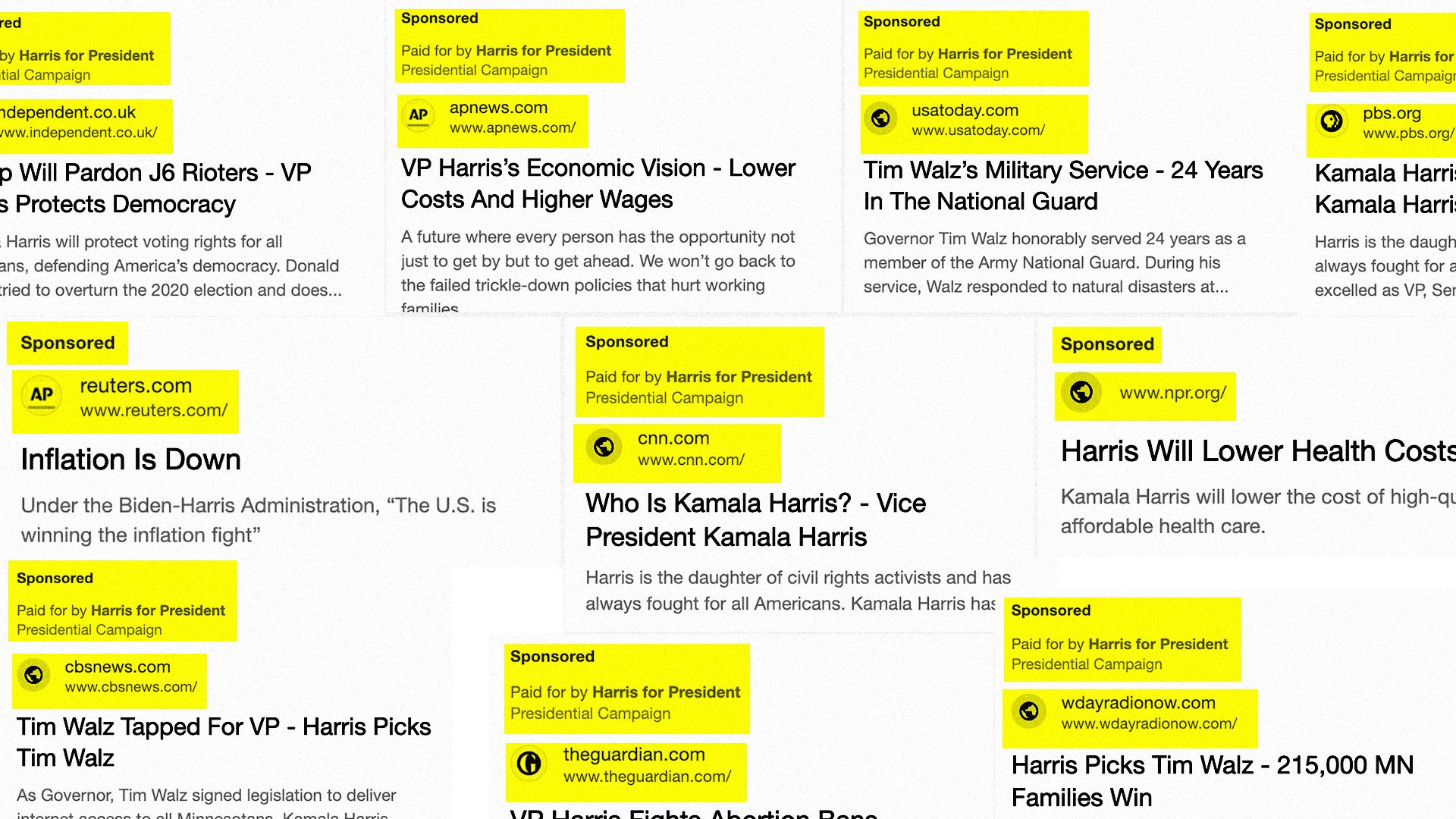
The Harris campaign has been modifying news headlines and descriptions within Google search ads, making it appear as though major publishers like the Guardian, Reuters, and CBS News are supportive of her, Axios has discovered.
Why it matters: This practice is common in commercial advertising and doesn’t violate Google’s policies. However, these ads resemble real news search results closely enough to have caught news outlets by surprise.
According to Google’s ad transparency center, the Trump campaign isn’t using this approach, though it has been utilized by other campaigns in the past. The ads are marked as sponsored, but it’s not immediately obvious that the text accompanying real news links is written by the campaigns rather than the media outlets themselves.
What they’re saying: A Guardian spokesperson stated, “While we understand why an organization might wish to align itself with the Guardian’s trusted brand, we need to ensure it is being used appropriately and with our permission. We’ll be reaching out to Google for more information about this practice.”
Representatives from CNN, USA Today, and NPR, whose links appeared in Harris for President ads, mentioned they were unaware their brands were being featured in this way.
Reality check: Google has confirmed that the ads do not violate its rules. However, platforms have historically struggled with whether this kind of format can spread misinformation.
In 2017, Facebook banned the ability for advertisers to edit text from Instant Article news links in their ads, as part of its ongoing efforts to prevent the spread of misinformation and false news.
Google contends that since search ads are clearly labeled as “Sponsored,” they are “easily distinguishable from search results.” A Google spokesperson added that for years, they have provided additional transparency levels specifically for election ads.
Between the lines: A source familiar with the Harris campaign’s ad team mentioned that the campaign purchases search ads with news links to provide voters searching for information about Vice President Harris with more context.
The campaign has adhered to all of Google’s rules, although a technical glitch in Google’s Ad Library made it appear as if some ads lacked the necessary disclosures required by Google when they were run. (A Google spokesperson confirmed the glitch and said it is investigating the issue.)
“Election advertisers are required to complete an identity verification process, and we prominently display in-ad disclosures that clearly show who paid for the ad,” the spokesperson said.
Zoom in: Since August 3, nearly a dozen news organizations have been featured in these types of search ads from the Harris campaign, Axios found.
These include The Independent UK, NPR, AP, The Guardian, USA Today, PBS, CNN, CBS News, Time, and others, including local outlets like North Dakota radio station WDAY Radio.
The ads contain links to actual articles from these news outlets, but the headlines and supporting text have been altered to suggest that the articles align with the Harris campaign’s goals.
For instance, an ad that ran alongside an article from The Guardian displays a headline reading “VP Harris Fights Abortion Bans – Harris Defends Repro Freedom” with supporting text that states, “VP Harris is a champion for reproductive freedom and will stop Trump’s abortion bans.”
Another ad linked to an NPR story reads, “Harris Will Lower Health Costs,” with supporting text stating, “Kamala Harris will lower the cost of high-quality affordable health care.”
The big picture: The political advertising landscape has always been complex, but the lack of regulation in the digital realm has placed the burden on tech companies to determine what is deceptive and what is fair.
Ad-driven tech companies must balance transparency with efficiency. One reason search ads are effective for advertisers is their placement in line with actual search results, in a format that closely mimics those results.
Google maintains that its sponsored disclosures are sufficient to prevent voter confusion, but media companies whose brands are being associated with political messages in unexpected ways may disagree.
The intrigue: The mainstream media industry is already contending with accusations of bias. These ads, even though they comply with Google’s rules, could make media outlets more vulnerable to claims of partisanship.
“Some of these news organizations might not want to be positioned as promoting one campaign, and this implies that they have a bias towards that campaign, potentially,” said John Gable, co-founder and CEO of AllSides, a nonpartisan firm that rates media bias.


